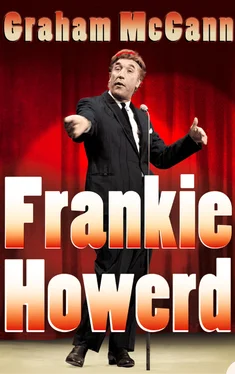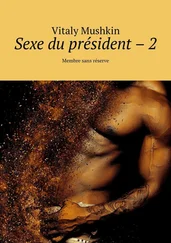Iâd been giving stage, not radio, performances . It was as simple as that. Listeners werenât able to see my expressions and gestures, and were baffled when the live audience laughed for no apparent reason â bafflement giving way to annoyance at the frustration of not knowing what was going on. 2
Having at last diagnosed the cause, he wasted no time in devising a cure. Instead of continuing to stand back and project his voice at the studio audience (as he had learnt to do on tour), he now resolved to step forward and address the microphone. The aim, he explained, was not to ignore the live audience (without whose laughter he knew he would always be lost), but rather to develop a different technique: âtransferring from visual to vocal clowningâ. 3
As was so typical of him, Howerd laboured both tirelessly and obsessively to effect the necessary change. âI used to do voice exercises, like a singer would do,â he recalled. âI used to go up: âA-B-C-D-E, A-B-C-D-E , A-B -C-D-E â. And then I used to go down: âA-B-C-D-E, A-B-C-D-E , A -B -C-D-E â. So I learned to use my throat muscles as I would my face muscles.â 4 He ended up being able to switch in an instant from a dopey baritone to a goosed falsetto, and then slip straight into stage whisper.
There were also many hours spent studying the recognised masters of radioâs more relaxed and intimate style of delivery â such as Americaâs Jack Benny (who, through the use of his sublimely timed pauses, had taught listeners to pay attention to what he was thinking as well as saying) and Britainâs Tommy Handley (who had the ability to race through reams of dialogue without ever sounding remotely rushed) â as well as many long and self-absorbed sessions in the studio, going over and over his act while practising standing relatively still and close up to the microphone.
Howerd did not stop there. He also took careful note of the seductive power of the well-spoken catchphrase. Having lived through the era of such hugely popular shows as ITMA â which, through weekly repetition, had coined several distinctive personal signatures out of common words and phrases, including, âI donât mind if I doâ; âAfter you, Claude.â âNo, after you , Cecilâ; âCan I do you now, sir?â; and âT.T.F.N â ta-ta for now!â 5 â Howerd could see and hear for himself how beneficial the odd verbal âgimmickâ could be, and so he started to think up a few all of his own.
His playfully unconventional way of emphasising the opening phrase âLadies and Gentle- men â had already become something of a trademark, but he now took to mispronouncing on a grander scale, stretching some words close to their limits (e.g. â luuu d- i -crousâ) while stretching the ends of others so far that they would snap off and shoot away like a stray piece of knicker elastic (e.g. âI was a- maaaazed !â). He also cultivated quite a few catchphrases all of his own: âNot on your Nellie!â; âMake meself comfyâ; âOooh, no, missus!â; âTitter ye notâ; âNay, nay and thrice nay!â; âI was flabbergasted â never has my flabber been so gasted!â; âShut your face!â; âAnd the best of British luck!â
There were also some changes made (of a more subtle nature) to the ways that he shaped the âsaucierâ sorts of material. The whole process now became far more devious and conspiratorial.
It had to be, because the code of self-censorship within the BBC was fast becoming even more neurotically draconian in peacetime than it had been during the war. Thanks to the efforts of the Corporationâs Director of Variety at that time, Michael Standing, all of the BBCâs producers, writers and performers who were working in the field of âLight Entertainmentâ now found themselves saddled with a short but extraordinarily censorious âpolicy guideâ known informally as âThe Green Bookâ. 6
According to this well-meaning but somewhat snooty little manual, âMusic-hall, stage, and, to a lesser degree, screen standards, are not suitable to broadcastingâ. The BBC, as a servant of the whole nation, was obliged to avoid causing any members of the nation any unnecessary offence: âProducers, artists and writers must recognise this fact and the strictest watch must be kept. There can be no compromise with doubtful material. It must be cut.â 7
In order to ensure that all of its employees understood what this âdoubtful materialâ might be, the manual proceeded to spell it out in sobering detail. There must, it said, be no vulgarity, no âcrudities, coarseness and innuendoâ, which meant âan absolute ban on the followingâ: â
Jokes about â
Lavatories
Effeminacy in men
Immorality of any kind
Suggestive references to â
Honeymoon couples
Chambermaids
Fig leaves
Prostitution
Ladiesâ underwear, e.g. winter draws on
Animal habits, e.g. rabbits
Lodgers
Commercial travellers
Extreme care should be taken in dealing with references to or jokes about â
Pre-natal influences (e.g. âHis mother was frightened
by a donkeyâ)
Marital infidelity 8
As if that was not enough to completely obliterate the average red-nosed comedianâs act, there was more: no advertising; no American material or âAmericanismsâ; no derogatory remarks about any profession, class, race, region or religion; no jokes about such âembarrassing disabilitiesâ as bow-legs, cross-eyes or (a particular blow this for Howerd) stammering; and, last but by no means least, no expletives (which not only meant no âGodâ, âHellâ, âBloodyâ, âDamnâ or âRuddyâ, but also not even the odd âGorblimeyâ). Writers and performers were also urged to keep the jokes about alcohol and its effects to an absolute minimum.
Just in case these commandments had left any dubious comic spirits still standing inside the Corporation, the manual went on to strike one final blow for decency. All performers were warned that on no account must there be any attempt to impersonate Winston Churchill, Vera Lynn or Gracie Fields. 9
The response of Frankie Howerd to these potentially suffocating restrictions was ingenious. He simply took whatever the censors had left and then proceeded to corrupt it.
Unlike most other comedians of the time, who remained prisoners of their patter (and whose patter consisted of most if not all of those topics that radio had now declared taboo), Howerd was not dependent on gags, and therefore found it much easier, during the course of his wireless ramblings, to slip in some of his own brand of sauciness just under the radar. Max Millerâs over-reliance on his so-called âBlue Bookâ had already earned him a five-year ban from the BBC during an earlier, slightly more tolerant, era; now, in the age of âThe Green Bookâ, the incorrigible directness of his material â (e.g. âI was walking along this narrow mountain pass â so narrow that nobody else could pass you â when I saw a beautiful blonde walking towards me. A beautiful blonde with not a stitch on â yes, not a stitch on, lady! Cor blimey, I didnât know whether to toss meself off or block her passage!â) â ensured that radio would render him speechless. Frankie Howerd, on the other hand, was able to survive by implying that it was the listeners, and not him, who were the ones with the ditty minds.
Читать дальше












